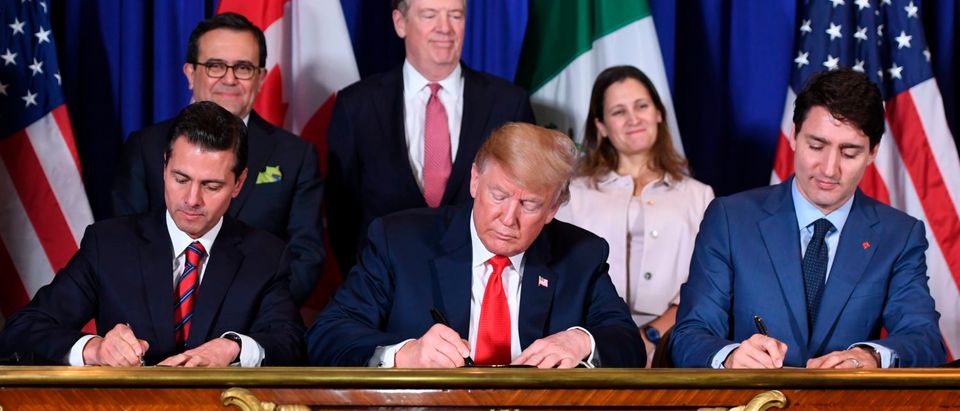The best trade deal the United States has ever been a part of was passed into law in 1993 and took effect on January 1, 1994. It was the North American Free Trade Agreement, or NAFTA. Our partners: Mexico and Canada.
While most experts consider NAFTA to have been generally good for the U.S., Mexico and Canada, there have always been critics. Critics like then-Congressmen Bernie Sanders and Charles Schumer. Those men were stupid on trade with Mexico and NAFTA in 1993, and the years since have not made them more intelligent. They voted no on NAFTA and voted no on Trump’s signature trade agreement.
On Thursday, January 16, these men, now U.S. senators, voted against the new agreement with Mexico and Canada (USMCA) that was negotiated by the Trump administration.
Schumer and Sanders generally agreed with President Trump that the 25-year-old NAFTA was a “giant failure” negotiated by dunces around President George H.W. Bush that allowed jobs to disappear in the U.S. and reappear in Mexican low wage factories.
That was as false then as it is now. American jobs are lost every day, and most never reappear in Mexico or China.
The Senate voted 89 to 10 in favor of the pact that the House had already approved on a bi-partisan vote. The House was influenced by support for the new USMCA agreement by the AFL/CIO leadership that forgot its traditional antagonism about trade with foreign countries unless Teamster union drivers are involved or union longshoremen unload ships from China.
The ten “no” voting senators are a mixed bag. Only one was a Republican, Pat Toomey of Pennsylvania — an important manufacturing and trading state. In fact, it exported $4.219 billion worth of goods to Mexico in 2018, up from $3.72 billion in 2014.
The other nine are eight Democrats and one Independent.
Independent Sen. Bernie Sanders of Vermont voted no. Vermont’s trade with Mexico — totalling $212 million in 2014 — shrank to only $45 million in 2018. Hawaii Sen. Brian Schatz also voted no. That reflects Hawaii’s slipping trade with Mexico, $1.12 million in 2018 — down from $1.5 million in 2014.
Sen. Cory Booker, who flamed out in his run for the presidency, voted no despite New Jersey improving its trade with Mexico from $2.65 billion in 2014 to $2.95 billion in 2018.
Both Democrat senators from Rhode Island, Jack Reed and Sheldon Whitehouse, voted no despite their state’s trade with Mexico slightly improving from $195 million in 2014 to $198 million in 2018.
Massachusetts Sen. Ed Markey voted no despite his state growing its trade with Mexico from $2.3 billion in 2014 to $2.5 billion in 2018.
That leaves the two Democratic New York senators, the failed presidential candidate Kirsten Gillibrand and the Senate Minority Leader Charles Schumer.
New York’s 2014 trade with Mexico was a respectable $3.06 billion that has grown to $3.5 billion in 2018. Nonetheless, Gillibrand and Schumer voted no.
They were joined by a senator one must wonder about. That is, one must wonder about her basic knowledge of trade and the jobs involved in every dollar’s worth of goods exported. She is California’s U.S. Sen. Kamala Harris.
For Harris’ information, California exported $25 billion worth of goods to Mexico in 2014; $30 billion in 2018.
In contrast, both Texas senators, Republicans John Cronyn and Ted Cruz, voted for USMCA. Why? Texas exported $100 billion worth of goods to Mexico in 2014. In 2018, it exported $109.8 billion worth.
If anyone needs an explanation why Senator Kamala Harris flopped so badly in her quixotic race for president, one need only look at (A) her no vote on the USMCA agreement, (B) the billions of dollars in business California does with Mexico, and (C) the millions of jobs involved. Her “no” vote on USMCA reflects an uninformed distaste for her own state’s well-being and of her habit of “tilting at windmills” in her aborted run for president.
Californians will not be shocked in 2024 when her opponent for re-election pounds her with her “no” vote on robust trade with Mexico and Mexicans.
Raoul Lowery-Contreras is the author of “A Hispanic View: American Politics and The Politics of Immigration;” he formerly wrote for the New American News Service of the New York Times Syndicate


